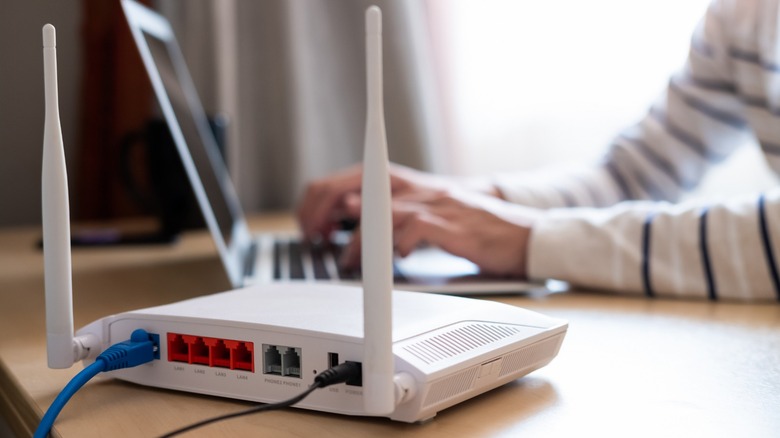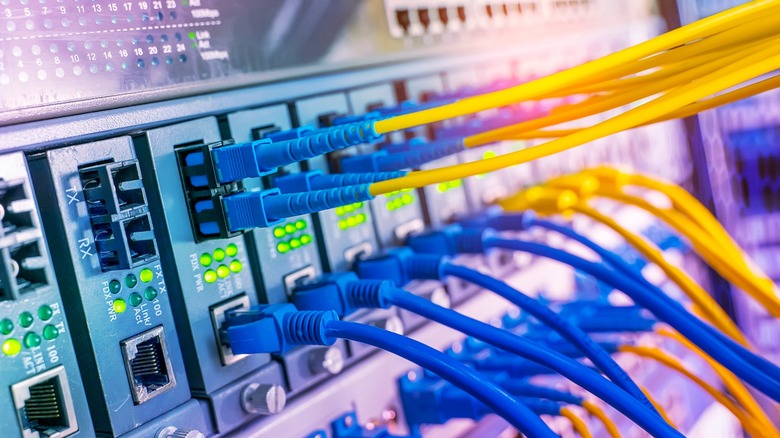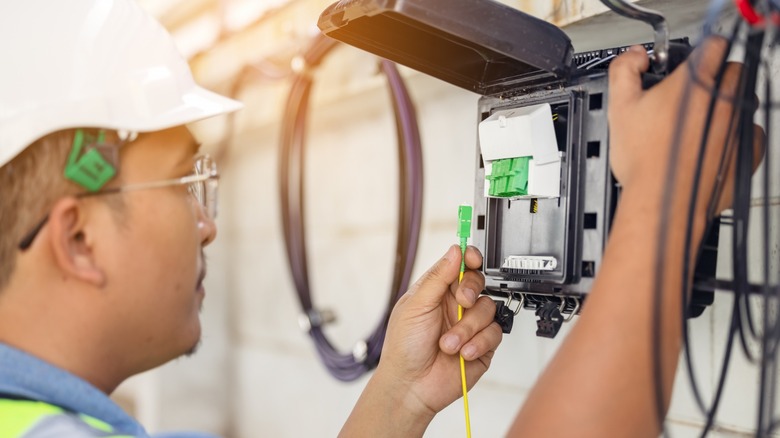How Fast Should Your Internet Be? Here's What You Should Know
With our ever-growing technologically-focused culture, having fast internet has never been more important. As more tasks and activities involve the World Wide Web, figuring out which service to pay for in a sea of competitors can be a tall task. Luckily, there are a few easy ways to determine how fast your internet should be to get the right service and save some cash in the long run.
When considering internet speed, there are two main metrics to be concerned with — download and upload speeds, which are both measured in megabits per second or Mbps. Download speed dictates how quickly your device receives data from apps and websites and is the metric that will affect the vast majority of tasks you'll perform online.
Upload speed is more important for things like gaming, live streaming, or uploading videos, images, or music to websites like YouTube. When seeking out a service, the most important metrics to look at are maximum download and maximum upload speeds. Here are a few gems to help gauge how fast your internet should be.
Typical broadband connection speeds
The Federal Communications Commission (FCC) defines the typical range for download speeds for broadband internet connections to be between 3-25 Mbps. According to the FCC, internet service that provides 3-8 Mbps download speeds qualify as "Basic Service," while speeds exceeding 25 Mbps qualify as "Advanced Service." However, to today's standards, 25 Mbps download speed is relatively slow, depending on where you live.
When considering what speeds you should aim for, consider what you are doing on the internet and how many people are connected to the router. Suppose two or more users use the internet lightly via browsing websites and watching low-resolution videos. In that case, it's possible to get away with a slower 15 Mbps download speed without lag or interruption to your connection.
However, suppose multiple people use the same internet and transmit a lot of data at once via streaming HD video, gaming, uploading videos, and streaming. In that case, there is a good chance that sites may load slower, videos may buffer, or it may take longer to perform downloads. In this case, investing a bit more into a faster connection may be worth it.
How fast the internet should be for HD video streaming
When trying to figure out which speeds are suitable for the tasks you're trying to accomplish, there's no better place to look than the apps themselves. According to Netflix, users who wish to stream high-definition (HD) video at 720p should have at least 3 Mbps or higher download speed. Minimum recommended speeds increase to 5 Mbps when talking about full-screen 1080p video resolution. The minimum required speed for a stable connection increases even further for 4K streaming to a recommended speed of 15 Mbps.
These speeds are based on single-device streaming, so the minimum recommended speeds will increase depending on how many devices simultaneously stream HD video. With multiple users utilizing the same connection for high-data tasks like 4K video, it's possible that videos could buffer or lag depending on how many additional connections are made. For slower connections, Netflix recommends lowering the video quality.
How fast the internet should be for gaming
In terms of gaming, higher speeds are obviously recommended, as faster internet speeds will reduce latency or the time it takes for your inputs to reach the game's servers, improving your reaction time in the game. While the minimum speed for most modern consoles like the PlayStation 5 is at least 5 Mbps, games may still stutter or lag at this speed, especially if the connection is over a Wi-Fi network. To maintain a stable, fun gaming connection, users should aim for internet service that provides at least 15-25 Mbps. These speeds are also required for other gaming activities, like cloud gaming.
However, to get the smoothest gaming experience — especially for reaction-based games like fighting titles or first-person shooters — users should aim for at least 50-100 Mbps download. In addition, unlike everything discussed so far, upload speed is also an important metric to determine latency in video games and could impact gameplay if the connection isn't fast enough. While some sources cite at least 1-2 Mbps as required, this speed could result in rubber banding or delayed inputs. According to AT&T, at minimum, a good gaming upload speed is 3 Mbps.
What is the fastest internet?
Regarding modern internet choices, various available options on the market can provide 100Mbps+ download speeds. The main kinds of internet used in the United States today include cable, Wi-Fi, satellite, and fiber optic connections, though some still connect over telephone lines with DSL. While cable is the most common service used widely in the US, with over 50% of people utilizing it, other options have been slowly gaining in popularity, like fiber optic internet, which accounts for 20% of users, according to Pew.
According to Speedtest, the median download speed in the United States for fixed broadband is 210 Mbps, with a median upload speed of 23.58 Mbps. Mobile Wi-Fi, which has improved significantly throughout the years, averaged 43.20 Mbps download and 10.23 Mbps upload. On the other hand, services like Verizon fiber optic boast up to 940 Mbps download and 880 Mbps upload speeds.
Finally, the newest and arguably most innovative way to receive internet is via satellite, which may provide higher speeds and greater access to the internet in remote locations of the world. Perhaps the most well-known satellite service, Starlink, created by Elon Musk's SpaceX, had median download speeds of 65 Mbps and 7.74 Mbps upload speed, according to Ookla. Ultimately, your internet speed will come down to what you need to do. If you aren't sure how fast your internet is, several services can test your internet speed.




